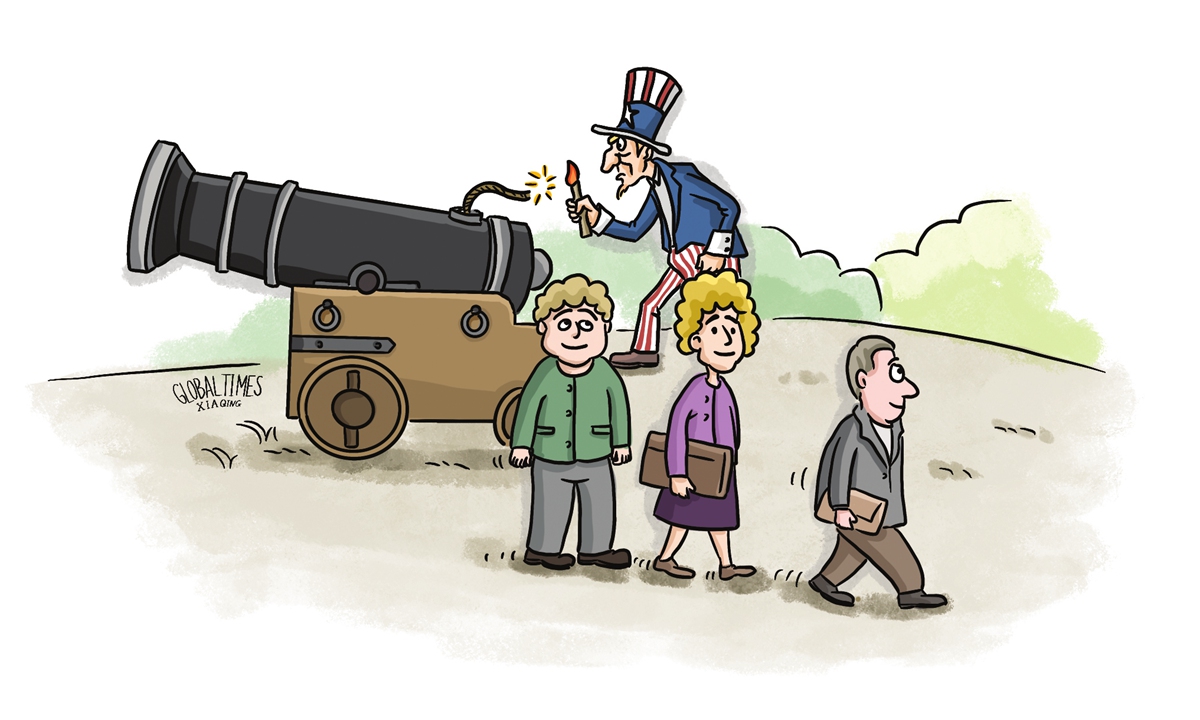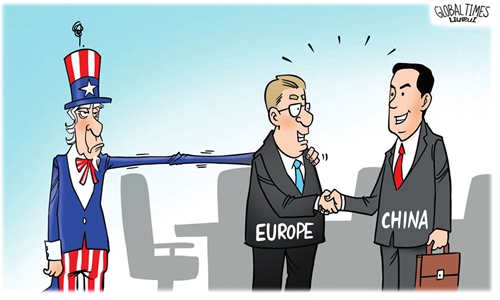Europe needs to defend strategic autonomy and escape US’ interference to prosper

Illustration: Xia Qing/Global Times
The question of Europe establishing an independent foreign policy is a key issue for world politics today. Whether Europe can successfully resist US pressure, reject its confrontational cold war positions, and instead pursue a policy of global cooperation, has serious consequences for Europe's security and its economic prospects.
Over the past year, support for the US' Cold War offensive, particularly sanctions against Russia but also on some issues with China, has become the new orthodoxy in some European political circles. The acceptance of such policies has had extremely negative consequences for European people. The Ukraine crisis has claimed tens of thousands of lives, and serious economic problems have arisen in Europe that are harming living standards. Considering this, a debate is opening up on whether a more independent path should be pursued.
French President Emmanuel Macron's widely reported comment that Europe must not be a "follower" of the US when it comes to the island of Taiwan and instead pursue "strategic autonomy" has revealed cracks in any European Cold War consensus.
These comments received an immediate backlash in the US and within Europe. But Macron is not alone in expressing Europe's need to establish some autonomy over its foreign policy. Spain's Prime Minister Pedro Sánchez emphasised the importance of Europe seeking "win-win cooperation" with China earlier this year, insisting that "relations between Europe and China do not need to be confrontational."
Europe's economic relations with China are extremely important. Figures from the International Monetary Fund (IMF) estimate that the Euro Area will grow by only 0.8 percent in 2023. China is estimated to grow six times faster - by 5.2 percent.
Slow economic growth, high inflation and government austerity policies are hitting living standards hard, causing social unrest across Europe where millions of people have protested in recent months against government economic and social policies.
Not only is China the world's most rapidly growing major economy, it is also the EU's largest trading partner and a crucial economic partner for Europe.
Unfortunately, following pressure from the US, Europe's economic relationship with China has deteriorated in some fields in recent years. For example, the Comprehensive Agreement on Investment between China and the EU, agreed in principle in December 2020, has not been signed despite the economic opportunities it opens for Europe. The US is asking European governments to join its attacks on China's technology industry, with some recently banning TikTok from government work phones.
The US' approach is harmful to Europe's economic interests - that is why some European leaders are advocating a more independent approach toward China such as Macron and Sanchez clearly understand.
Deepening economic cooperation between Europe and China could bring huge benefits to European people; open up opportunities for increased trade and investment, job creation, access to the best and cheapest technology, scientific collaboration, people-to-people exchanges and more.
Europe's most urgent issue is ending the devastating war in Ukraine. This war could have been avoided if the US had not intervened to foster the conflict.
The war was caused by the US policy to expand NATO up to Russia's border, including the proposal that Ukraine join NATO when Russia has repeatedly made clear that such a move represents a "red line" threat to its security interests.
Unfortunately, major European governments supported this US policy toward Russia.
Over the past year tens of billions of dollars' worth of military aid has flowed from NATO countries in North America and Europe into Ukraine. Rather than support negotiations to end the conflict, NATO countries are escalating the conflict.
China's peace plan calling for dialogue to end the conflict is an initiative which corresponds with Europe's interests. Negotiating a lasting peace in Ukraine would save tens of thousands of lives and allow for the massive sums being wasted on military aid to be re-directed to tackle vital issues such as the cost-of-living crisis, climate change and improving people's lives.
The US is unfortunately not supporting proposals for peace in Ukraine and is instead pushing for escalation and a prolonged conflict. European governments could break with Washington's path and join countries calling for peace such as China and Brazil to back negotiations to end the conflict.
The US is regrettably determined to drag European governments into supporting its aggressive foreign policy against both Russia and China and will continue to pressure Europe to follow this divisive and harmful approach. It is clear, however, that for Europe to live in peace and prosperity, it must break free from this Cold War agenda.
The author is a writer based in London and a member of the No Cold War campaign international committee. opinion@globaltimes.com.cn

